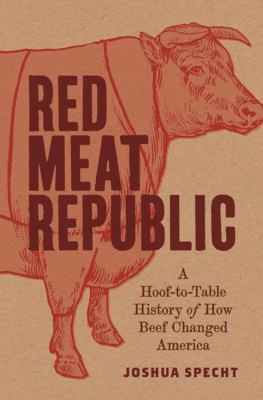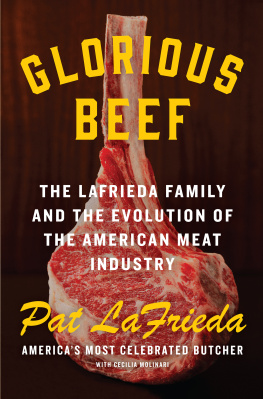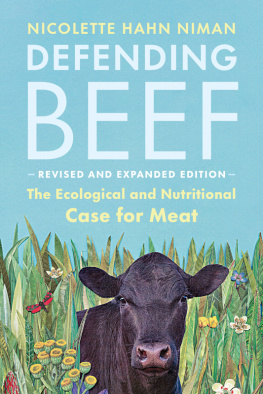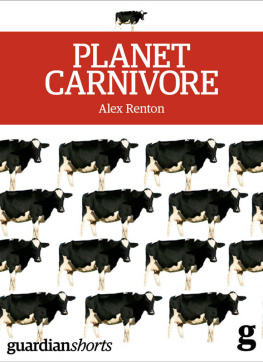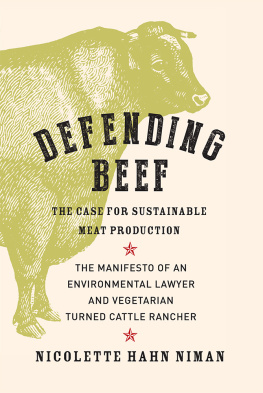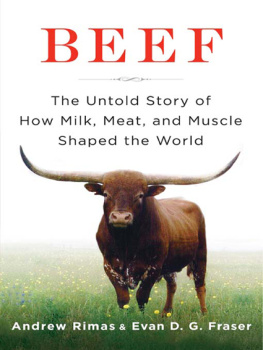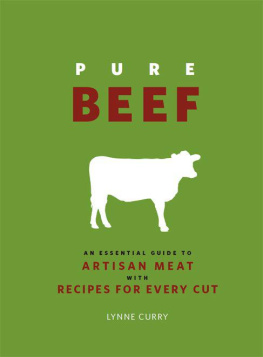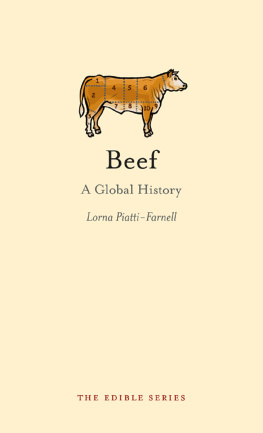Contents
Page List
Guide
MORE PRAISE FOR RED MEAT REPUBLIC
Spechts evocation of specific placesfrom the plains and the varied sites of industrial labor to the shops where meat was bought and the tables at which it was eatenpersuasively grounds his story in American culture. This is an impressive and compelling book.
HARRIET RITVO, author of Noble Cows and Hybrid Zebras: Essays on Animals and History
Peeling the plastic wrap off the cut, Specht uncovers the political economy of modern meat, from violent dispossession to high-stakes struggles over labor and profits.
KRISTIN L. HOGANSON, author of The Heartland: An American History
Spechts wonderful and impressive research covers an enormous territory. Red Meat Republic will reshape historians approach to this important topic.
JOHN MACK FARAGHER, author of Eternity Street: Violence and Justice in Frontier Los Angeles
RED MEAT REPUBLIC
HISTORIES OF ECONOMIC LIFE
Jeremy Adelman, Sunil Amrith, and Emma Rothschild, Series Editors
A list of titles in this series appears at the back of the book.
Red Meat Republic
A HOOF-TO-TABLE HISTORY OF HOW BEEF CHANGED AMERICA
JOSHUA SPECHT
PRINCETON UNIVERSITY PRESS
PRINCETON & OXFORD
Copyright 2019 by Princeton University Press
Published by Princeton University Press
41 William Street, Princeton, New Jersey 08540
6 Oxford Street, Woodstock, Oxfordshire OX20 1TR
press.princeton.edu
All Rights Reserved
Library of Congress Control Number: 2018954992
ISBN 978-0-691-18231-5 | eISBN 978-0-691-18578-1
British Library Cataloging-in-Publication Data is available
Editorial: Amanda Peery, Eric Crahan and Pamela Weidman
Production Editorial: Jenny Wolkowicki
Jacket design: Chris Ferrante
Jacket art: Alvin Davison, The Human Body and Health (New York: American Book Company, 1909) 38. Clipart, courtesy of FCIT
Production: Jacqueline Poirier
Publicity: Julia Haav and Kathryn Stevens
Copyeditor: Maia Vaswani
This book has been composed in Arno Pro
Printed on acid-free paper.
Printed in the United States of America
10 9 8 7 6 5 4 3 2 1
For my parents
CONTENTS
ACKNOWLEDGMENTS
LIKE MANY ACADEMICS, I read the acknowledgments first. They give a sense of the authors intellectual world, revealing the connections that shaped his or her ideas and approaches. But more than that, acknowledgments provide a sense of the community that makes a book possible. To Red Meat Republic, the people below gave intellectual energy and support; to me, the people below gave the emotional strength to see the project through.
This project could not have been written without the help of people at archives across the United States and in Canada. The biggest thanks of all are due to the archivists at the Southwest Collection at Texas Tech University in Lubbock, Texas, and the Panhandle-Plains Historical Museum (PPHM) in Canyon, Texas. Thanks to Randy Vance at the Southwest Collection and Warren Stricker at the PPHM. Without the ranching sources in these archives, the broader story would not have come together. Then again, if these archives were not quite so organized about getting corporate ranching records from Scotland, I might have gotten a funded trip there as well. For the Chicago component of the project, the Newberry Library and the Chicago History Museum provided excellent support. A visit to the Library and Archives Canada in Ottawa made the section on the Grand Trunk Railway possible. The staff of Harvard Business Schools Baker Library was invaluable when it came to research suggestions and helping me make sense of nineteenth-century trade cards. Finally, though I never physically visited the Kansas Historical Society, Lisa Keys and Teresa Coble were incredibly generous to a distant academic who always needed one more scan or photocopy.
Thanks also to the organizers and participants of the various conferences and workshops where I presented this material, such as the American Society for Legal History Conference; the Scales of the Economy workshop at Sydney University; the American Cultures Workshop at the United States Studies Centre in Sydney; the American Society for Environmental History Conference; the Business History Conference; the Society for Range Management annual meeting; the Massachusetts Historical Society; and the Workshop for the History of the Environment, Agriculture, Technology, and Science. Finally, I did much of the revision of this manuscript as a Ciriacy-Wantrup Postdoctoral Fellow at the University of California, Berkeley. Thanks to everyone I met in the College of Natural Resources Department of Environmental Policy, Science, and Management, particularly Kathryn De Master, who helped me navigate Berkeley, and Lynn Huntsinger, who recruited me for the Society for Range Management Conference.
Thanks as well to everyone at Princeton University Press. When I first approached Princeton, I had a set of interesting (though rough) chapters and a mostly terrible introduction. Amanda Peery recognized that there was something to the project and helped me turn the introduction into a piece of writing that makes people take notice (or so I hope). Later, she did the same for the full manuscript. I had heard you dont get editing like this anymore, so I consider myself lucky. Thank you to Brigitta van Rheinberg for her advice and good company when we met in Melbourne. Maia Vaswani has been a thorough and thoughtful copy editor. Thanks to her for putting up with my poor understanding of capitalization and general sloppiness. Eric Crahan and Jenny Wolkowicki helped tremendously in the production phase.
This project began at Harvard. My supervisor, Walter Johnson, signed my dissertation acceptance with an exclamation mark, and this was ample encouragement to turn it into a book. Ive always been amazed by his ability to distill a set of convoluted ideas to their important core, and thankfully he shared some of that ability with me. Thanks, too, to Emma Rothschild, who believed in the project from the start and has often stepped in with crucial support. Jill Lepore, who rounded out my committee, taught me to think like a reader and that theres nothing more difficult, or rewarding, than writing well.
Thanks also to my friends at Harvard who helped me develop the ideas that would become Red Meat Republic. In particular, Philippa Hetherington, Ross Mulcare, Ben Siegel, and Jeremy Zallen were important interlocutors and friends. Thanks as well to Greg Afinogenov, Mou Banerjee, Jessica Barnard, Rhae Lynn Barnes, Rudi Batzell, Eva Bitran, Shane Bobrycki, Rebecca Chang, Eli Cook, Rowan Dorin, Josh Ehrlich, Emily Gauthier, Tina Groeger, Carla Heelan, Philipp Lehmann, Aline-Florence Manent, Jamie Martin, Jamie McSpadden, Yael Merkin, Erin Quinn, Mircea Raianu, David Singerman, Liat Spiro, and Jenny Zallen.
I completed the manuscript at Monash University in Melbourne. Charlotte Greenhalgh was revising her own manuscript as I worked on mine and her support and insight kept me from climbing out of my office window. Clare Corbould not only provided intellectual insight and career advice, but she and her family made me feel welcome in Melbourne. Meanwhile, Adam Clulow is a model of a charitable and engaged colleague, providing me with encouragement and advice about book revision. Thanks also to Bain Attwood (who helpfully read the whole manuscript), Andrew Connor, Ian Copland, Daniella Doron, Jane Drakard, David Garrioch, Heather Graybehl, Michael Hau, Peter Howard, Carolyn James, Julie Kalman, Ernest Koh, Paula Michaels, Ruth Morgan, Kate Murphy, Kathleen Neal, Seamus OHanlon, Susie Protschky, Noah Shenker, Agnieszka Sobocinska, Taylor Spence, Alistair Thomson, Christina Twomey, and Tim Verhoeven.

